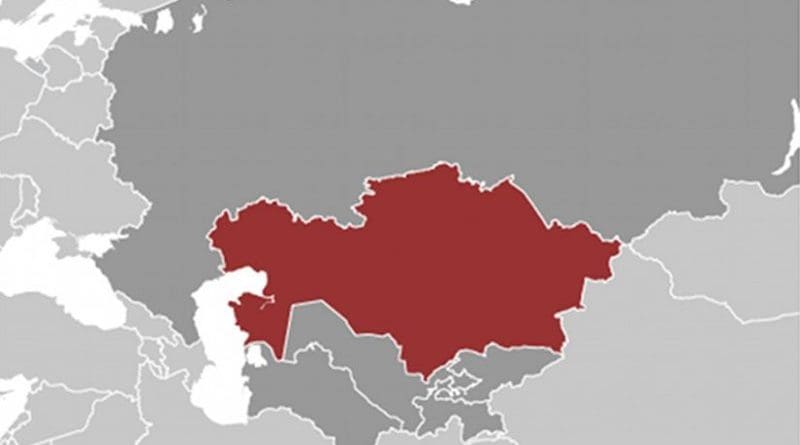Kazakhstan To Spend $840M On Countering Religious Extremism
By Eurasianet
Security officials in Kazakhstan have reportedly said that they intend to spend more than $840 million over five years on state programs aimed at preventing terrorism and the spread of extremism.
Speaking on March 6, the deputy head of the National Security Committee, Nurgali Bilisbekov, said that there was “still a high level of extremist and terrorist propaganda that could enable the radicalization of Kazakhstani society.”
Although media reports have not spelled it out, the figure cited by Bilisbekov appears to relate specifically to educational and outreach initiatives, not to security measures.
Kazakhstan regularly sounds the alarm about the pressing risks of terrorism. One source of that threat is seen coming from radicalized Islamic militants originally from Kazakhstan returning from Syria and Iraq. The KNB has said that 125 Kazakh nationals returned from conflict zones last year — and that of that total, 57 have been prosecuted. (Media reports citing Bilisbekov on those figures on March 6 uniformly fail to specify a timeframe, but prior reporting of the same data indicates that the numbers apply to 2017).
Bilisbekov said that among the returnees, there are an unspecified number that “continue to hold radical views.”
“We are doing preventative work with them with a view to rehabilitation,” he said.
Bilisbekov said that a state anti-extremism program scheduled to run from 2018 to 2022 will draw on “modern approaches” adopted abroad and methods based on the collective experiences of state workers, experts and the general public. The overall budget of 270 billion tenge ($840 million) will be spread out over 80 programs.
“The level of effectiveness of this work will be measured according to a target indicator, which is taken to be the annual diminution in the dynamic of people prone to radical influences,” he said.
Evaluating who may or may not be “prone to radical influences” is an inescapably subjective exercise.
Anti-religious extremism legislation now in the works indicates that Astana’s official definition of what constitutes people either at risk or posing danger is currently very broad indeed. Speaking to reporters in January, Religious Affairs Minister Nurlan Yermekbayev casually threw out multiple examples of what could single somebody out for suspicion.
“Among the external attributes of destructive religious currents, we could include things that are characteristic for radical currents in Islam. For example, preaching intolerance, clothes that cover your face, certain types of beards and short trousers,” Yermekbayev said.
A glib but perhaps not wholly unfair reading of such remarks might lead one to conclude that Kazakhstan’s government intends to spend almost a billion dollars on ensuring, among other things, that people’s trousers are the right length.
Outreach is nothing new for Kazakhstan though.
The impulse to increase control over religion gained fresh energy in the wake of violent events in June 2016 in Aktobe. A group of more than 20 men in the western Kazakhstan city attacked two hunting-supplies stores, grabbing shotguns that they then used to mount a doomed assault on a military garrison. Seven people were killed and dozens injured in the unrest.
President Nursultan Nazarbayev dubbed the attackers Salafis and claimed that they had received their orders from abroad. He then instructed officials to tighten legislation and control over “non-traditional religious groups.”
In January, officials in the Aktobe region, where the Salafi current is said to have the deepest roots in Kazakhstan, announced that their “theological work” had successfully converted 400 people in 2017.
More research is needed to understand quite what that particular wave of “theological work” looked like, but some clue is offered by the fact that they were implemented in the wake of Nazarbayev’s assertion that the Aktobe violence was a consequence of Kazakhstan being too free and liberal.
“Taking advantage of the liberality of our policies and laws, somebody or other wanted to test government authorities for strength,” he said.
But Bilisbekov’s talk of “modern approaches” implies hardline solutions will be eschewed in favor of something else, although what precisely is not immediately clear.
In a recent interview to Expert Kazakhstan magazine, religious affairs expert Said Baiburin advances the case for adopting a tolerant stance toward a wide spectrum of religious views.
“We need to take the example of the United States, Canada and Australia. They have a liberal approach, and that is what we lack here. There they don’t ban a single book on Islamic theology. They understand that there is no point in bans when you can find it all on the internet anyway,” Baiburin said. “We need to lift the lid on a boiling pot to let out the steam. If we shut the lid tight, then it will spill over.
Regardless of the efforts any government makes, a certain number of individuals seems inevitably destined to fall under the sway of dangerous militant influences.
The KNB claims that it has prevented 440 aspiring combatants from traveling to Middle Eastern hotspots. The broad trend is toward marked diminution, perhaps a reflection of the shrinking appeal found in the prospect of getting killed in a distant conflict — 62 citizens of Kazakhstan were prevented from leaving to fight in 2017, down from 91 in 2016, 151 in 2015, and 136 in 2014.
Other figures show Kazakhstan’s government wants it both ways, however. While Astana is eager to be seen successfully combating terrorism, it also insists that the problem has intensified. The KNB says that it has prevented 30 terrorist attacks in the past four years — three in 2014, four in 2015, 12 in 2016 and finally 11 in 2017.
If hundreds of millions of dollars are spent on vague exercises in trying to meet arbitrary “target indicators” while the alarm about terrorism stubbornly refuses to dissipate, something will have gone seriously wrong.

